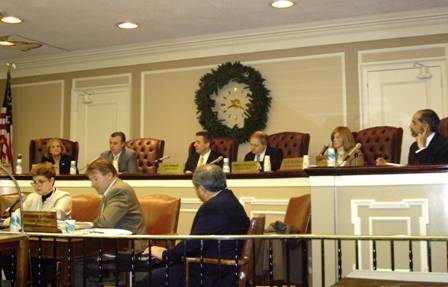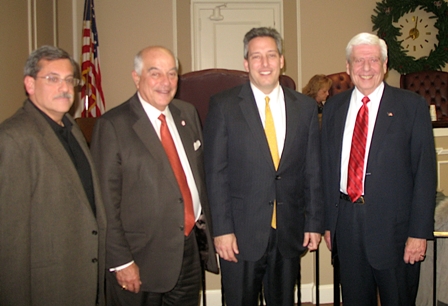Immediate Release Contact: Collin Nash December 16, 2008 (516) 869-7794
Town Board Enacts Sanitation Law Requiring the Disposal of Solid Waste by Town-operated System
Manhasset, NY—The North Hempstead Town Board Tuesday enacted a revised sanitation law, giving the town all inclusive responsibility for all the municipal solid waste and recyclables generated and collected within its borders.
The so-called flow control law passed by a vote of 6-0. One town council member was absent.
Flow control allows state and local governments to designate where and when municipal solid waste is transported for disposal. In North Hempstead’s case, it requires all local villages, schools, and businesses to be part of the same town-operated system, although villages are granted an absolute right to opt out if so desired.
“This was an extraordinary, longstanding process that will impact our community for the next generation,” Supervisor Jon Kaiman said.
North Hempstead’s enactment of the revised law portends major implications for the town, the first municipality on Long Island to re-instate the law. In 1994, the U.S. Supreme Court ruled that flow control unconstitutionally infringed on interstate commerce. The Court reversed the ruling in 2007.
“For one thing”, said Supervisor Jon Kaiman, “we anticipate that the efficiencies in having all solid waste under the rubric of one authority will reduce expense, facilitate better oversight and enhance environmental considerations. For example, the flow control ordinance will give the town greater waste disposal oversight with the ability to prevent illegal dumping of solid waste and the improper disposal of recyclables,” Kaiman said.
The promise to enhance North Hempstead’s sweeping, ongoing recycling initiative is a major motivation behind this new law, Kaiman said. The town recently placed recycling containers throughout the town’s network of parks, libraries, town buildings and in each of the classrooms of most of the municipality’s eleven school districts.
Under the law, all residential and commercial municipal solid waste collected in the town must be brought to the town-owned and operated transfer station in Port Washington unless otherwise designated to alternative sites. Carters will be charged a yet-to-be-determined, per-ton tipping fee similar to that which is presently charged.
All the town’s 31 villages, most of which currently are contracted to dispose their waste at the town’s transfer station, will have the option of continuing their relationship with the town or making their own arrangements to dispose of their waste.
The Town believes that authorizing villages to opt out of the ordinance requirements is consistent with the equal protection clause of the constitution in light of the villages’ inherent police powers and municipal authority, Kaiman said.
Town Councilman Angelo P. Ferrara said in a statement that he applauded the idea of inter-municipal cooperation fostered by the newly passed law.
“I would like to commend the town and the villages for negotiating in good faith and working as partners,” Ferrara said. "I believe everyone, especially the taxpayers, benefit from this legislation and I am in full support of it.”
##

Top Row (L to R): Councilwoman Maria-Christina Poons, Councilman Tom Dwyer, Supervisor Jon Kaiman, Councilwoman Lee Seeman, Councilman Robert Troiano
Bottom Row (L to R): Town Clerk Leslie Gross, Town Attorney Richard Finkel

(L to R) Munsey Park Mayor Harry Nicolaides, North Hills Mayor Marvin Natiss, North Hempstead Supervisor Jon Kaiman, Saddle Rock Mayor J. Leonard Samansky